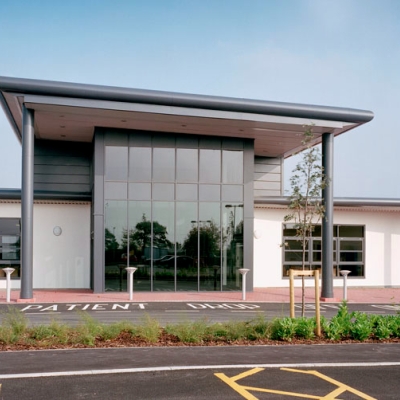Please find more information on other treatment's used in Bowel cancer care that you or your consultant may wish to discuss.
The Papillon technique is a groundbreaking type of contact radiotherapy developed for the treatment of rectal cancer, especially those in the early stages, meaning surgery can be avoided. It is especially important for patients who are not suitable or keen on extirpative surgery. For those patients who are able to undertake the treatment, their subsequent quality of life is much better as they will not require a stoma bag.
The Clatterbridge Cancer Centre was the first British centre to introduce Papillon contact radiotherapy in 1993. Since then, we have been at the forefront of the development of the treatment, and are a leading centre for the training of clinicians internationally.
How does the Papillon technique work?
Contact radiotherapy (low energy x-ray treatment) is recommended for patients who are not fit enough for general anaesthesia, or who do not want major surgery and the formation of a stoma.
If the cancer is small (less than three centimetres) with no evidence of lymph node spread, then local contact radiotherapy using the Papillon treatment can be considered as an alternative treatment option.
For further information please visit the website for further information The Clatterbridge Cancer Centre at Liverpool :: Papillon
A colonic stent is a flexible tube designed to keep the bowel open when it has become blocked (obstructed) or partly blocked by bowel cancer. The stent is made of a metal mesh, sometimes coated with silicone.
Please see patient information leaflet, click here.
If you have been diagnosed with advanced cancer, your healthcare team may offer you treatment to manage your symptoms and improve your quality of life. They will also offer you emotional support and practical advice. This is called 'supportive' or 'palliative care'.
This page describes what palliative care involves and where to get support and more information.
Dealing with the news
Being told that your cancer can’t be cured, or that your treatment will be palliative, can be distressing and worrying. Some people think that palliative care is for people at the end of their lives. But this isn’t always the case. You can have palliative care alongside cancer treatments that aim to help you live longer.
What is palliative care?
Palliative care aims to:
- Provide relief from pain and other distressing symptoms
- Help you stay as active as possible
- Provide emotional and spiritual support
- Help you live a full life and treat dying as a natural process
- Offer support to your family to help them cope.
Palliative care can’t cure your cancer, but it aims to improve your quality of life. You may have palliative treatments alongside your cancer treatment when you are first diagnosed with advanced bowel cancer, or soon after. This can help you cope with the symptoms of your cancer and the side effects of your cancer treatment, such as pain, sickness, tiredness and emotional stress. Some people may start palliative care after their cancer treatment has stopped working.
Palliative treatments may include:
- Chemotherapy
- Radiotherapy
- Biological therapies
- Complementary therapies
- Pain relief – Macmillan Cancer Support has information on pain and pain relief
Palliative care also offers emotional, social and spiritual support to you and your family. It helps you to stay independent for as long as possible and helps you make decisions about your care.
Getting palliative care
Where possible, you should be able to choose where you would like to be cared for. You may have palliative care at home, in hospital, at a care home or in a hospice. You may also be able to visit hospices during the day to have palliative treatments, complementary or creative therapies and to take part in social activities. A range of organisations offer free palliative care, including the NHS, social services and voluntary organisations.
You may get care from your regular healthcare team, a specialist palliative care team and from family or friends. Your GP or healthcare team can refer you to a palliative care team or tell you what palliative care services are available locally.
Palliative care teams are made up of staff who specialise in palliative care. They may be based in your local hospital or hospice. They may include doctors, specialist nurses, clinical psychologists, counsellors and other health professionals, like physiotherapists and dietitians. They will listen to your wishes and beliefs and offer emotional and practical support to help you make decisions and carry on with your everyday life.
Support for family and friends
Family and friends often give valuable care and support to people living with advanced cancer. Caring for someone can be challenging. If you are caring for a loved one, you may have times where you would like more support or more of a say in how your loved one is cared for.
The healthcare team can be a good source of local support for friends and family. The following organisations also provide information, advice and support for family and friends who are caring for someone with a life-limiting illness. Looking after yourself and getting the help you need will allow you to support your loved one.
Carers Trust supports unpaid carers by providing breaks, information, advice and education, training and employment opportunities.
Carers UK gives support, information and advice to family and friends who act as carers.
Healthtalk.org has videos of carers talking about looking after someone with a terminal illness.
Marie Curie has detailed information on the practical issues of looking after someone as well as where you can get support.
Children and young people can sometimes find it difficult to understand what is happening when a family member has a life-limiting illness. You can read about talking to children on our diagnosis pages. The charity Riprap and the healthcare company BUPA also have information for children and young people.
Good life, Good Death, Good Griefhas a website signposting to information and support for individuals and families in Scotland.
Bowel Cancer UK - Treating Advanced Bowel Cancer
More information
Hospice UK has information on hospice care and how to find your local hospice or you can speak to your GP.
Macmillan Cancer Support has information on controlling symptoms and side effects and on palliative care.
Maggie’s offers free practical, emotional and social support to people with cancer and their families and friends.
Marie Cure provides information on palliative care.
NHS Inform has online palliative care information for people living in Scotland.
Stomas
A stoma is where a section of bowel is brought out through an opening on your stomach area (abdomen). Your bowel movements (poo) are collected in a pouch or bag attached to the skin around your stoma.
Types of stoma
There are two types of stoma - a colostomy is formed from the large bowel and an ileostomy is formed from the small bowel.
Colostomy
A colostomy is a stoma formed by bringing part of your colon (large bowel) out on to the surface of your abdomen. The waste from a colostomy is usually more formed than from an ileostomy, as it has had some of the water removed on its way around the bowel. The waste passes out of the colostomy and is collected in an external pouch (known as a colostomy bag).
Ileostomy
An ileostomy is a stoma formed by bringing the end or a loop of the small bowel (ileum) out on to the surface of your abdomen. The waste passes out of the ileostomy and is collected in an external pouch (known as an ileostomy bag). Ileostomies are often formed during rectal cancer surgery to allow the area to rest and heal after surgery. The waste produced is usually liquid rather than solid.
Your surgeon or specialist nurse will explain why you need a stoma, what type of stoma you might have and how long you might need it for. If your stoma surgery is in an emergency, you may not be able to meet your stoma nurse before you go in for your operation. If your surgery is planned, you will meet your stoma care nurse before your surgery. They will show you how to look after your stoma and answer any questions you may have. It’s not always possible to know 100% if you will need a stoma before your operation, as the decision can sometimes only be made during the surgery. You can contact your stoma care nurse for support at any time before or after your surgery.
Stoma supplies
When you go home from hospital, your stoma care nurse will give you some stoma supplies. Once you are at home, you will need to get further supplies from a chemist or from a stoma supply company. If you live in England you’ll need a prescription from your GP and, if you are under the age of 60, you will need to sign a form to get free prescriptions. All prescriptions are free if you live in Scotland, Wales or Northern Ireland.
Managing your stoma
Some people struggle to get used to their stoma and find it difficult to manage day-to-day life. Others find it affects the way they see themselves. Your stoma care nurse is there to support you and answer your questions.
Eating and drinking with an ileostomy
When we eat, the colon absorbs water and salts from our food. If you have an ileostomy, either temporarily or permanently, food will no longer reach the colon. This means you will need to make some changes to your diet.
After surgery, the output from the ileostomy is likely to be liquid. Over six to eight weeks, your body will adapt and the output may become slightly thicker, like toothpaste. Eating regularly can help with this. If you still have a watery output, speak to your stoma care nurse, GP or consultant. They can give you medicines that can help.
Some foods may cause blockages, increased output, wind or odour.
Eating and drinking with a colostomy
If you have an ‘end colostomy’ then the output from your stoma is more likely to be formed and less frequent. If your colostomy is further up the large bowel, the output may be less formed (toothpaste consistency) and may work more frequently.
On the whole, once the food reaches the large bowel most of the digestive processes have been completed. This means that you do not need to follow a special diet unless you have been advised by your GP or dietitian. Following your operation and in the early days, certain foods or drinks may upset you, this is very individual. If you think a particular food or drink has upset you, leave it for a few weeks then try it again. Keeping a food diary can be helpful to identify these foods.
Some foods may cause wind, constipation or loose and runny stools (diarrhoea).
Availability of service
The service is available Monday to Friday 8-00am –6-00pm (excluding bank holidays) and is specialist nurse led with support from administration assistants. If you have a problem or have any concerns, please contact the team on 01270 612443.
The team operates a prescribing hub which is managed and led by Stoma Care Specialist Nurses.
To request a prescription for stoma products you can phone the team on 01270 612443 (8-00am---4-30pm)
Alternatively you can email a request for a prescription to CCICPSnaps.

